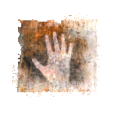Please wait a few moments while we process your request

Universidad Nacional de Colombia, Fine Arts and Visual Arts Master Program
Quiasma
(Bogotá, Colombia)
Quiasma is a research group in the master's program in fine arts and visual arts at the Universidad Nacional de Colombia. The group is made up of three artists: Bárbara Santos, Clemencia Echeverri, who teaches at this university, and Andrés Burbano, who teaches at the Universidad de los Andes. Together, they develop communication strategies blending art, technology and culture.
In many areas of Colombia, violence has become endemic because of the drug cartel, guerrilla warfare and paramilitary activities. A feeling of constant danger weighs on the people, who endure curfews and travel restrictions and suffer enormous emotional distress (or estado de conmoción interior) (1). In such an environment, the written and audiovisual media and new telecommunication tools such as cellphones and the Internet have become standard means for areas stricken by violence to keep in touch and exchange information. Meanwhile, television has become the main medium for representing the daily life of Colombians. Yet the members of Quiasma feel this medium offers only one perspective and often gives a warped view of reality. Quiasma's new project, which the Foundation is supporting, will zero in on areas of Colombia torn by war and conflict. One of the group's goals is to produce audiovisual material that serves as a bridge between symbolic images and media images.
As a source of data for this project, Quiasma has chosen three cities in three parts of Colombia marked by violence: the Caribbean lowlands, the Andean highlands and western Colombia. Each area is home to traditional rituals and festivities that, despite the violence and insecurity, have surprisingly endured and become a strong means of resistance. These traditions help ensure that as much as possible life goes on as normal in these communities. Quiasma's aim is to create a series of videos, photographs, and sound and musical recordings that offer Colombians an artistic experience to counter the media's pernicious effects. Ultimately, the group sees itself as a catalyst for change.
The project will run from November 2002 to November 2004. The material produced will air on television and the radio and appear on the Web. The complete data will be presented on a DVD.
In many areas of Colombia, violence has become endemic because of the drug cartel, guerrilla warfare and paramilitary activities. A feeling of constant danger weighs on the people, who endure curfews and travel restrictions and suffer enormous emotional distress (or estado de conmoción interior) (1). In such an environment, the written and audiovisual media and new telecommunication tools such as cellphones and the Internet have become standard means for areas stricken by violence to keep in touch and exchange information. Meanwhile, television has become the main medium for representing the daily life of Colombians. Yet the members of Quiasma feel this medium offers only one perspective and often gives a warped view of reality. Quiasma's new project, which the Foundation is supporting, will zero in on areas of Colombia torn by war and conflict. One of the group's goals is to produce audiovisual material that serves as a bridge between symbolic images and media images.
As a source of data for this project, Quiasma has chosen three cities in three parts of Colombia marked by violence: the Caribbean lowlands, the Andean highlands and western Colombia. Each area is home to traditional rituals and festivities that, despite the violence and insecurity, have surprisingly endured and become a strong means of resistance. These traditions help ensure that as much as possible life goes on as normal in these communities. Quiasma's aim is to create a series of videos, photographs, and sound and musical recordings that offer Colombians an artistic experience to counter the media's pernicious effects. Ultimately, the group sees itself as a catalyst for change.
The project will run from November 2002 to November 2004. The material produced will air on television and the radio and appear on the Web. The complete data will be presented on a DVD.
Dominique Fontaine © 2002 FDL
(1) Source: The Web site of Canada's Department of Foreign Affairs and International Trade.

